Don't wanna be here? Send us removal request.
Text
Sitting in a cool, draughty chamber, the King’s velvet chair-of-estate surrounded by Romanesque pillars and watched over a painted gallery of French bishops, martyrs, and saints, Henry received his daughter with a slight incline of his mouth. Custom bade him to outstretch his hand, clinking with the precious jewels deprived of his coffers; paternal reverence compelled him to squeeze Margaret’s little white hand in turn, an action undetectable to the pack of jowly barons eyeing their meeting. Henry, too, observed Margaret’s movement, heeded her words, with a measure of caution. Of all his imperial brood, it was she who he understood the least; she who could mask her mind with gilded words and unwavering homages the finest. Yet in her Henry saw a glimmer of himself: something cool, slick, seamlessly adaptable, a hunk of marble glowing molten-blue in the furnace.
‘Rise, Marguerite,’ He commanded, lifting to his feet, a wave of attendants heaving upwards around them; precipitated by a spate of grumbles. ‘Be not hesitant to ask, princess. I would have your ambitions known to me – not merely as your King, but your lord father. I detect it is not my counsel you ask, but perhaps my permission to act as you would?’ He arched a brow, the twain roles of kingship and fatherhood melting into a singular, imposing figure. Her Yorkist lord may have proved to be more of a peacock than a political thinker, but if Margaret was indeed Henry’s daughter, she would have already born notions of strategy in her mind.
status: closed to @lancastrie
Margaret had mostly kept herself to herself since arriving in the Kingdom of France, behind closed doors she had concentrated on intricate embroidery between practising her languages — devout in her studies, for if she was to be presented before the other gilded courts it would not be that second daughter of England to scorn the disappointment of her father and her cherished country. Draped in emerald green, her mother’s hair concealed beneath a henin of precious linen, Margaret thought to turn over what laid in wait for both herself, her parents and the future of England, twisting the fates of the crown within her hand before going to her father’s side, entering his quarters with little fanfare as she often did, her head bowed before a kiss was pressed to each cheek. “Father,” she called, falling back, her hands held then against her bodice as candlelight danced against those cold walls. “I wondered if it is a good time… to ask what it is you want of me in this fair country…And if there is anything I may do in your name,” She asked, dropping then to her knees, taking his bejewelled hand into her own as she kissed his royal ring.

1 note
·
View note
Text
I come from a long line of people with something wrong with them
121K notes
·
View notes
Text
@alienored continued from x
Firelight dragged and glinted over Alienor’s cheek, a slash like a sunbeam across her face; her eyes, even in the dim glow of the hearth, pulsing like two clear, icy streams. They were blue, like his own, the colour of cornflowers in the July-heat; surmounted by a halo of sun-gold hair that made faint the lines of age that appeared about her eyes as they pored over a manuscript, or inspected a delicate ring at close. But, this Henry knew, an asp hissed beneath her honeyed exterior. Even as a queen-in-waiting, whose duty it was to clasp her hands, hear nothing, and heat her husband’s bed, Alienor had fortified herself with a determined directness, a polished stalwartness, that invoked the loyalty of his barons and stirred the envy of courtly belles. Her veins, after all, housed the watery blood of Virgin Mother, and her lineage – sprung from the venerable house of Poitiers, rich in silver and fecund with sons – was old, ancient. The Lancastrians appeared upstarts in comparisons; a new duchy, with little honour or pride to fall back on. Only the hope that Henry, in whose broad frame aspirations of usurping the throne had been kindled, would one day seize his rightful place among the highest of the land.
‘By my word, never,’ vowed Henry, giving a sly wink, sparing nary a thought to the fact that both the King of England and le Roi of France lacked sons – two rivals, bitter enemies, without true heirs to the throne. That, he deemed, was a rumination better suited for another day. For now, Henry eagerly embraced the indulgences of kingship, stirring the fragrant wine in his goblet with a flick of a wrist, and casting a sidelong glance at his wife, her smooth flesh buttered with pearls. As he observed Alienor’s movements, Henry arched a dark, inquisitive brow at her rise, and sudden drop, into her velvet-cushioned chair; her cheeks glowing as pink as sunrise as she jested with him. ‘If my words brought you such grievous displeasure, I warrant that you would find no trouble in kicking me, whatever afflictions may ail you. I seem to recall a night, twenty-six years hence, when the back of your hand proved a fitting tool to express your discontentment.’ He brought a hand to his cheek, as if recalling the blow, as a mischievous grin curled at his lips. ‘I never asked you to address me upon your knees again, did I? Or, at least – not in such terms.’
Leaning one shoulder against the hearth, Henry’s lips thinned in thought. ‘Must I summon you for you to appear at my side?’ He requested; his hard gaze riveted upon hers. ‘My fealty to the land is both a gift and a burden. I am unable to rest, for the thought plagues me, should I meet my demise…’ Hanging his head, recent visions of a ghastly death – swiftly dispelled by a concordat of astrologers and priests – danced before his eyes. Alienor’s words only served to darken the pall that now hung over his visage. ‘The betrothal is sealed in blood; there is nothing to be done. Were we to annul it now, it would only hasten the Yorks’ lust for the throne. A foreign prince would ignite their enmity… Nay, our hands are bound.’ At least, with his own brother away in the Holy Land, Henry could trust that it was not Stephen who would stir such mutiny. ‘I trust, madam, that I can rely upon you to present a united front on the matter, as our vows intended. Your concern is noble, but you needn’t exert yourself. We entrust our affairs to the lawyers, to the people of England, and to God. If their duty to their anointed King does not ensure their loyalty, they shall bow before the Holy Father unquestioningly’.
Swallowing another mouthful of wine, Henry deposited his chalice on the mantle and, striding toward Alienor, sank to his knee before her, a hand curving around her thigh. ‘Forgive me.’ He gently bade. ‘My words are cruelly spoken. I would go to any length to ensure our children’s safety. Though the cost is great, I see in them your goodness, your fortitude. Will you not stand with me, wife? Stand with your King?’

0 notes
Text
@ofanjous continued from x
Grief had hardened Isabella’s appearance: that heavily jeweled, sharply chiseled countenance, proudly poised on her long neck, now worlds apart from the Queen who once governed England, languishing under the protection of a weak, unstable King. Yet, time had failed to shave away the vestiges of striking allure – beneath the pall of grief and enmity held the bones of an exquisite women, once professed to be the most beautiful of all European brides. But the rank fog that hung over the battlefield, smothering the blood-soaked soil from which Henry had snatched his crown, and the unearthly wails of husbands, sons, thickening up the ground with their gorged bodies, had devoured Isabella’s patience for him; a moth-eaten thread. Henry saw it clearly: the revulsion burrowed in the amber of her eyes, molten.
To her, Henry Plantagenet would die an Earl of March – worse still, a usurper.
Her words were slippery, a gore-slicked dagger’s shaft. The King maneuvered about them with a soldier’s vigilance, careful not to permit his own ire to ignite, to lick into a full-fledged flame. In truth, the boy’s loss clung to him, like the smell of that acrid, demonic fog rolling over Towton, engulfing those it blanketed in smoke. But then, had God and St Gabriel not gazed smilingly upon him, that scarred, mud-soaked face, the sour haze dissolving under the weak heat of an April sun? Blazed his blood-soaked tunic with Kingly glory? ‘We all have our crosses to bear, Isabella,’ Henry uttered. ‘Not one among us is without taint of sin. And, if my memory serves me, there be some among us who question if the blood spilled that day truly ran blue. The Almighty himself has proclaimed me King – His chosen vessel. Whose mortal tongue am I to refuse the decree of Divine Providence?’

Fixed on the crucifix surmounted above them, Henry returned his gaze to hers, the clash like steel blades, and continued: ‘we both suffered that year.’ Grim memories of his own father – stripped, tortured, mocked by Edmund’s legions – flickered in his eyes. A paper crown, so whispered witnesses of that macabre day, placed onto his brow before that heavy head struck a pike. ‘Whether the son of a king, or that of a butcher, Fate has been cruel. It is a sad day in England when so many lives – boys with implacable promise – are lost.’ Henry made to lay his hand across Isabella’s but, as his fingers hovered over hers, the coolness of her flesh – like that of an immortal corpse – compelled him to stop. ‘Is it not high time we drain the rivers of blood, and come together in concord of our shared isle?’
0 notes
Text
The King’s cloak clung damply to his frame from the insistent downpour, the hard, belligerent gallop from the Saint-Chapelle – where, at the sacred altar, enfolded in a cloud of incense, he’d knelt and prayed to the Virgin as dusk bled into twilight – back to the Hôtel. He arrived just as a fresh rain of arrows began to surge over the cluster of spires, washing away the putrid stench of summer’s rot into the river. The furrowed brows, sallow faces, and occasional wet coughs of his barons reminded Henry to take paints not to catch chill, though the air was thick and balmy, and the corridors of the palace heated with crackling fires. With determination flickering in his gaze, a resolve like marble, indestructible and impenetrable, Henry ventured through the Plantagenet’s suite of dimly lit apartments and into those occupied by his eldest daughter.
Ensuring not to unsettle her, Henry bade his pack of blood-thirsty lords to remain several paces back, as he alone strode forth to appear at Katherine’s door. Seeking solace from the ice that now stung at his skin, Henry made a wide, prowling circle around his daughter, predictably – and characteristically – heedless of her consideration for his health. A weary smile crackled at Henry’s lips as he observed her hurried ascent, the shaking of her skirts as she rose, flustered, both obedient and loving in her concern for her father, the King. ‘No, your mother did not send me,’ Henry remarked, his voice still. ‘I would know your mind, Katherine. The Queen and I have been blessed to have you within arm’s reach, although the freedom to converse openly is a rarity bestowed upon us.’

A solemn expression settled heavily over his visage. Henry seldom spoke idly, for time had proven the most precious, and irrecuperable, of all heavenly benedictions. Within and without his domain, he issued forth commandments with a boldness that, if condemned for its bluntness, had been implacable in its ability to corral even the unruliest of subjects; his power was irresistible, his authority absolute. Yet to Katherine, he tempered his tone, the hardened stones of his eyes softened, clement, at the corners; two mirror images, two Kings, folding in on one another. ‘If God, in His mercy, deems it so, you shall one day ascend the throne after me. I would know that you are strong enough to bear what is asked of you.’ Hovering a hand over her shoulder, the warmth of his palm bleeding into her skin and bone, he continued: ‘use this time in Paris to your advantage, daughter, and I will proclaim you as my heir.’
Closed starter for @lancastrie
As insomnious as she had been from the moment she set foot at the Hotel, so she remained. Finding herself aimlessly staring into the fire of her chambers while she sat at a small desk. The wooden top was fairly empty, the few papers and books scattered across offering room for her tired frame to rest on her elbows. Attempts at sleeping in the foreign bed had been fruitless. So had been the nightly walks to ease her mind. So in the end she had resorted to simple acceptance that she might as well be the only being awake at this ungodly hour, apart from maybe a few mice. - It came as a surprise to hear the creaking of the heavy door of the chamber. Offering her a brief moment to snap back into the presence, before a figure, cloaked in royal shades, entered her chambers without warning. No gentle knock, no spoken announcement.
It took her no longer than the blink of an eye to recognize her father, the King. The English heir was uncertain, rather the sight of her father calmed her or made the knot in her stomach twist even tighter. Now, more than ever before, a weight began to form upon her shoulders. The weight of a legacy she would have to carry if the King were to fall ill or die. At times she could not help but wondered if the King of England dared to put his trust in her. An undesired heir to inherit the crown, but faith had dealt its cards. No amount of prayer directed towards the heavens seemed to make a difference. Even if they both had wished it to be different.
“Has mother send you?” she asked plainly, as if in that moment they were nothing more than parent and child, before she collected herself. “Forgive me. I did not mean… … Should you not be resting, father? Undoubtedly, these political matters drain one’s energy.” As she spoke, she slowly placed down the goose-quill pen she had still been holding in her hand before. Looking down at the paper on which she had attempted to collect her thoughts she found but loose, meaningless scribbles. The product of an absent mind that continued to wander.

2 notes
·
View notes
Text
Under a silver, celestial moon, the votive candles of the chapel glowed radiantly, a thousand honeyed flames, like the eyes of a cat, prancing in the cool draft. The acrid, musty fumes of so ancient a dwelling pricked at the King’s irises as he entered, veiled with the rich aroma of perfume. It was a scent that Henry recognized with alacrity: musk melded with incense and infused with a flavour uniquely regal, though its familiarity brings little comfort. It is the odour of decay, of the fallen Lancastrian branch, rotting into the earth; the revoltingly sweet scent of wilted roses. The kneeling figure of Isabella of Anjou is no surprise, for he has been instructed to find her here: the she-wolf in repose, lips uttering forth solemn prayers, indulging in something of a depraved comfort in her own holy grief –– the loss of the Lancastrian saviour. Was it Henry’s throne for which she sought divine communion, or would his death be sufficient?
The King of England’s heavy footfalls reverberate about the stone chapel, followed by the faint rattle of a ruby-encrusted sword, sheathed within the folds of his robe. Enveloped in a cloak of dignified silence, Henry chooses not to correct her, now, as he ambles toward the altar, a crusader’s cross resting in his hands. The church is a sanctuary whose power Henry recognizes, fears – it is God’s will that his kingly knee bends to, that Heavenly figure who cradles his beloved prince in his sinless embrace. ‘Is this how you greet a friend, fair lady, after these many years apart?’ The King asks, now standing by her side. Thunder howls, buzzing with impending rain, stirring through the arched chapel windows; inky tendrils at the nape of his neck stand on end as he casts a sidelong glance at the former Queen.

‘It appears you are now more Scot than your native French, yet do we not pray in the same Latin? Do we not yearn for the same prosperity for our kin? Circumstance hath transformed us into adversaries, yet there was a time when our noble Lancastrian cause bound us as one.’
The King, with his dark head bowed low, lifted one candle and with this lit another, its feeble flame a pathetic offering to the Trinity. ‘I offer my condolences on the passing of thy boy,’ He speaks, softly, turquoise eyes fixed on the candle, struggling to ignite anew. When, at last, it fumed with smoke and sputtered a magnificent yellow glow, he utters: ‘know that our shared loss extends beyond the mere passage of time.’
tagging: anyone !!
location: the chapel within hôtel saint-pol
it had been some thirty years since isabella had departed her homeland for a throne she no long coveted and a husband no longer compendious. within that time, she had returned to the country of her birth only once, then she had been a queen as radiant as the sun in splendour, basking within the regality of her status. now she was naught more than a pitiful exile, shrouded by grief, vexation and an all consuming hunger for vengeance. the experience, may have been humbling to most – a prime example of how fortunes wheel could cast even the mightiest into the murkiest of waters – yet for isabella, the turning of the wheel had only heightened her own hubris. ardent in her belief they would one day bask in the sun’s rays once more, she had fortified, exerted patience and watched henry’s court as though a predator stalking its prey, awaiting the opportune moment to strike.
such a moment had finally arrived, after twenty long years she had the opportunity to flex her political prowess within the court of her french relatives. her letters of support may have gone unanswered in the past, but to hear her pleas parted from her own honied lips was something no king nor emperor could disregard. whilst it was true that her position had been weakened since the death of her son, her husband still breathed and as greatly as she wished their roles had been reversed, at the very least he was still a direct threat, if only in theory alone. it was for them both that she had taken to her knees in prayer that morning, the quietude of the chapel soothing her tormented soul and offering guidance for a woman who had long-since lost any semblance of sainthood. with her final declaration of devotion uttered, isabella made the sign of the cross upon her person, raising to her feet in order to light a candle for the slain martyr sprung from her own womb.
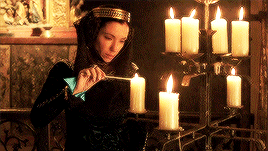
“ hasten to tell me what should be so important as to disturb a queen at prayer.” she spoke to the figure looming within the shadows. there had been a time when tears stained her cheeks upon her solemn reflection into all that had been lost and she would have confronted any trespasser, friend or foe, with the damnation of fire and brimstone, lest they gaze upon isabella in anything but her queenly regality. tears had long since ran dry, the drought of emotion hardening to icy glaciers.
9 notes
·
View notes
Text
@alienored continued from x
The scarred flesh that roped across his countenance had long ceased to rankle, ridged and weathered although it appeared. Pricked by torchlight, and warmed by the tender slant of the Queen’s lips, Henry gladly received Alienòr’s embossing of wifely devotion to the cheek. He cast his gaze downward, turquoise eyes swimming in the dewy, half-melted gleam of rich tapers, amused by her remark. ‘But no one,’ sparred the King, absently drumming his fingers against the oak, glowing smoothly under his palm, ‘is as susceptible to women’s virtues than the current King.’ A snigger resonated within his chest; his chin rose to meet Alienòr’s trained gaze with a wry leer of his own. ‘Virtue, or its absence, shall we say?’ He cut her gaze with a sardonic grin, wavering between prosaic taunts and jovial repartee. In his thirst for opulence and finery, King Henry was more Frankish than otherwise – but in marrow and sinew he was formed from all the ascetic saints of England, who instilled in their scion a smarting repugnance for the French. This ancient discord had been fecundated by the Queen’s own quarrels with the late King, latched at Aquitaine’s bosom of wealth like a babe at its mother’s bitter teat.

‘In looks and in mannerism, I see.’ Henry’s dark brows made for his forehead, as raven-black as the tresses that spilled from the eldest Plantagenet’s milky crown. Katherine, his heiress; for all her fortitude, her steely, benign placidity, it at times deeply moved Henry to think that she was no longer the child, the nestling, weaving in and out of his legs, leaving no stone unturned in her boundless curiosity. Wiping the spectre of reminiscence from his countenance Henry remarked: ‘that her blood is Plantagenet is doubtless. Her maternity, on the other hand…’
He observed, with one brow arched haughtily over his eyes, as Alienòr’s deft, tapering fingers swiped his goblet from the table. Predictably, her mouth soured and curled with distaste at the bitter brew that lapped at her tongue. The King resisted a chuckle as she returned the drink to his keep. ‘Is my countenance so visibly infected with thought?’ He gently bade. The Queen’s mask of youth had fared far better than his –– as so, it seemed, did her poker face. Henry was, like most sovereigns assembled in Paris, allowing himself to be impressed by the worthy atmosphere of mirth and elation, seduced into pleasing snares and games of diplomacy held beneath canopies of gold and concord; but matters at home, as always, weighed ineluctably on the spirit. Woes that, in the present climate, denuded themselves like a serpent bathing on the Roman-tiled squares of the Hôtel Saint-Pol.
The King rose to his feet, ambling toward the smorgasbord to replenish his wife’s goblet. ‘It would seem –– I am as surprised as you –– that you mistook my cup as your own.’ He made to hand Alienòr her cup but not, without, ducking his head low to stamp his mouth against the golden part of her scalp; only with this benediction bestowed did he pass the cup into her hand, the sapphires worn on their fingers interlocked; the intimate transaction complete. ‘Whatever infects my mood, it is nothing that needs trouble my lady wife. You are the milk and honey of the summit, my disquiet is unworthy.’
Striding toward the hearth, Henry nurses his goblet aside its ardent flame. ‘And the Princesses? Are they much remarked for their learning and grace?’
0 notes
Text
@georgesofyork
The Parisian climate had been benevolent to its English occupants, a conclave whose bloodline was, nevertheless, gritted to bear frigid, dripping climes; barren chills that penetrated the costliest of sable, whipped and roped at the vein-mapped countenance. The King’s dark-tressed curls brandished rust in the white-flaring sun; the balmy taste of optimism, like ripened apricot, dethawing on the lips. In the mirth and revelry of the day, the chime of laughter and of the tolling bells of Saint-Denis, in the company of crowns and bishops’ mantles, Henry derived no small iota of pleasure; indeed, the piquancy of summer had always boded well with the King. It was, after all, to the marshy, sunburned battlefield, and the bloated, impassable rivers of June, that he owed the victorious attainment of his holy crown – winter had served only misery, meted out only death and malady.
Henry’s movements were fluid, genial, as he glided across the warmed courtyard; the strides of a soldier, of Caesar stepping across the Rubicon, and no shrewd, miserly sovereign, ruling stubbornly, compactly, from a kingdom on the remotest fringes of the world; more populace in boars than noblemen. Henry was all ease, crinkled eyes, boisterous laughter. In splendid velvets, and in buoyant spirits, no one would dare presume that England was a realm that lay on the brink of anarchy. Nor, however, did circumstances allow Henry to forget this woebegone fact. Emerging from between a column of rippling pendants, the swaggering figure of George of York was as sobering as a spear’s tip, sliding at the throat. Hardly as insidious as their lord father, in whom the King possessed but little faith, Henry watched the Neville scions closely. It was in George, however, that he kindled the warmest of sentiments; Henry saw in him the babe he’d cradled in his arms, those liquid eyes, powdery scent, brought to a basin hung with gold-brocade and christened into the true faith, before all of England – shoving roots into a bond that would prove ineradicable. Though chiefly the boy’s sovereign lord, who asserted his authority energetically, the King would concede there was a deeper kinship that ran between a godfather and his godson, than a man in vicarious desire of a son; one that the discord sewn between dynasties could not supplant. And soon, very soon, they would be conjoined in all but blood.
Henry extended a hand, flashing with the heirloom he wore on his pinky, gesturing for the boy, grown into the strapping figure of a man, to draw nearer. ‘My lord York. As I accept you as my natural son, I ask you to allow me the honour of addressing you by your name. Little would bring the Queen’s highness, and myself, more pleasure than for our family to be the merriest in England.’
1 note
·
View note
Text
@alienored

The Holy See professes that fasting and abstinence purifies the soul, makes lusty men even more saintly in the eyes of God, but tonight the provisions are ample. Cloudy-eyed servants, draped in gossamer wimples, dip in and out of the King’s chambers to deliver bowls upon bowls of victuals, joints of hearty bore, bread pregnant with precious oils, goblets of blessedly unwatered wine, picked from the French King’s own vineyards. In the cold, damp streets below, a cacophony of chatter flares up, ladies cluck in the mizzled nightfall, and bishops hum out their sonorous chants, swinging flaming incense about, sanctifying the palace with rich, earthen smells (for God is displeased by foul odours, though not, evidently, by indulgence).
Henry Plantagenet’s heavy hand looms over the oak table, its blackened grooves and splintered contours hacked from an ancient log. His ruby heirloom clinks against the wood, appearing molten in the hearth’s amber glow. The table has been cleared of food, but wine and ale flows in abundance; Gascon, German, Italian, corked in better times. None, of course, English –– that sweet, viscid nectar of the marshy moorlands, where Brutus trampled over thistles, where dragons belched out flames –– though this is a sin Henry readily forgives.
The King quaffs another swig, his countenance immovable with thought.
Though a tempestuous channel now separates him from that misty isle, his kingdom lingers upon the conscience; a court of hawks and eagles, unwilling exiles and conquerors, unrest rumbling out from the Council of the North, sickness leaching in from Ludlow. An image of his boy, now twelve years in the grave, with the soapy scent of youth still upon him, beckons. The English retinue, with so many and such lively princesses, had dazzled the Parisian convocation. Their pious King; their holy, freely-moving Queen. But it would not take more than a hard glance to peer past the plastered exterior, and into the moulting, crumbling centre of their primaeval keep.
Henry’s thoughts, to whatever acidic depths they might have descended and fizzled like an old coin, are snared in the net of Aliénor’s emerging presence, dispatching from the long, yellowed shadows of the evening; a radiant, golden beacon, her long throat nuzzled by the soft grey plumes bunched about her shoulders, her freshly plaited hair tapering down her spine. She is not dressed for a reception in the Great Hall, splashed with pearls, bedecked with the richest of English jewels; but brought low to the role of a wife, a maiden, her body sculpted, softened with tokens of childbearing –– all of it the more pleasing to the husband who’d warmed her lovely bed, these twenty years.
‘Wine,’ the King begins, tipping his chalice toward his wife, ‘must run in Charles’s veins. Though I predict that its soporific quality may be of value to us. Come, sit. Are our daughters abed?’
1 note
·
View note
Text

𝙻𝙰𝙽𝙲𝙰𝚂𝚃𝚁𝙸𝙴 – faith, i have been a truant to the law / and never yet could frame my will to it, and therefore frame the law until my will.
statistics / introduction.
0 notes
Photo





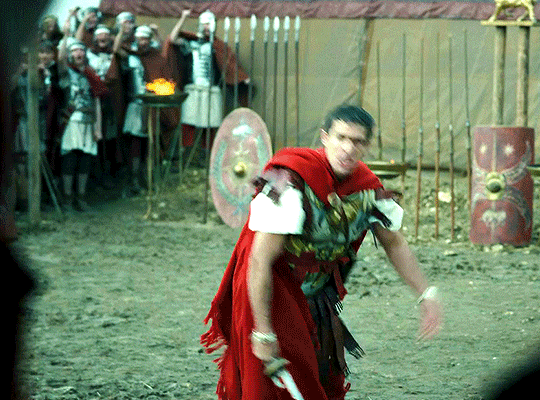


Germanicus, son, Rome has an endless supply of brave commanders. But you, you will become the next emperor.
Alessandro Fella as Germanicus Julius Caesar in BARBARIANS season 2
579 notes
·
View notes
Photo
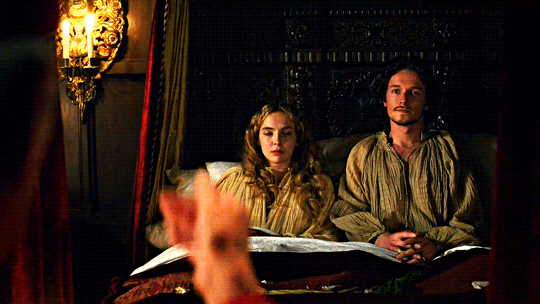

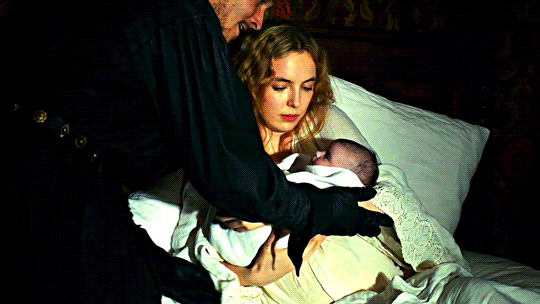
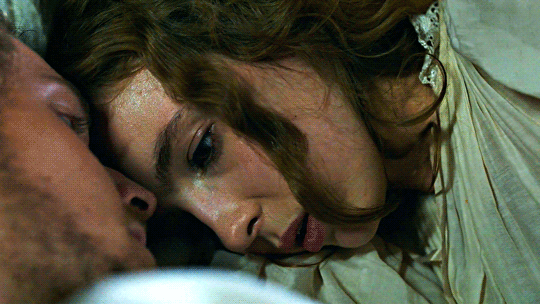


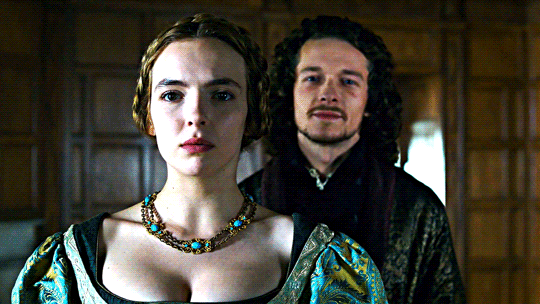
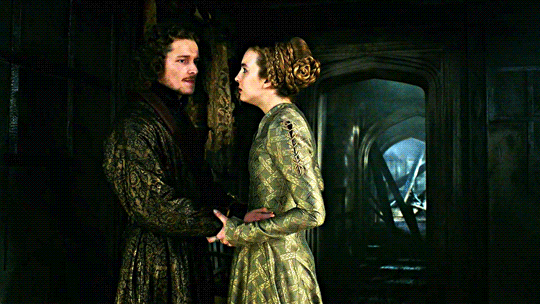

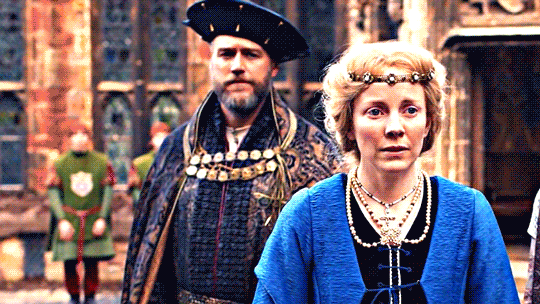
Henry and Elizabeth through the years - requested by anonymous
800 notes
·
View notes